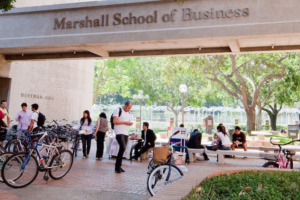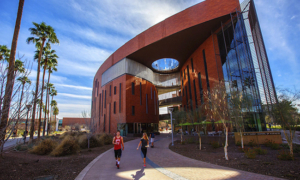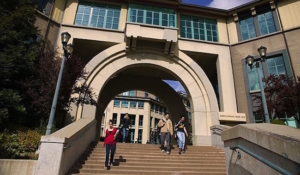
Undergraduate business education is a field of study that is ripe with innovation. The days when students arrived, only to march through a set group of classes with little connection to each other are long over. The best business schools are experimenting with myriad ways to provide meaningful learning experiences for their undergraduate students.
Many provide what can be called “signature experiences,” often consulting projects with nearby companies where students work closely with managers on a significant business challenge. Many others provide a portfolio of global immersions that go far beyond the more traditional semester abroad programs. And still others have put together elaborate professional development initiatives, pairing students with coaches and mentors to increase their odds of career success.
Overall, business programs are more global, technologically advanced, collaborative, and innovative than your grandparents’ (and parents’) version of B-school. From the rise of business data analytics to a increasing focus on entrepreneurship, business schools across the U.S. have enacted some highly innovative and creative curricular and extra-curricular changes. Below are some of the most innovative changes and trends happening now in undergraduate business education.

USC’s Marshall School of Business
1. World Bachelor in Business — University of Southern California Marshall School of Business
Enrolling its first cohort during the fall of 2013, the World Bachelor in Business program is one of the most unique ways to earn an undergraduate degree on the planet. A joint program between the University of Southern California, The Hong Kong University of Science and Technology, and Bocconi University, students spend four years studying at all three schools on three different continents, starting with USC’s Marshall School of Business. Students are required to spend a year on each campus and then choose which campus to spend their fourth and final year. At the end of this novel program, graduates are awarded three degrees from three universities–for the price of one.
The program enrolls 40 to 50 students a year and applicants must meet admission requirements for all three universities. It is one of the few undergraduate business programs that requires an admissions video. Admissions committees from each school meet virtually to decide who will be admitted. During the first application cycle for what will be the Class of 2017, more than 900 high school students from around the globe applied for the 45 spots. Some 115 students were admitted.
“I see this type of program as the future of business education,” Diego Graterol, a junior in the program, told Poets&Quants in 2015. Graterol said he and his classmates were given every opportunity of students spending all four years on the same campus.
“When we came in we were treated like Marshall students, so we got to do everything that regular students do and have the experience of being a freshman at USC,” Graterol said. “Now it’s off to the next country and the next adventure.”
For more about the WBB program, see this article.
2. Management, Entrepreneurship, & Technology Program (M.E.T.) — University of California-Berkeley Haas School of Business
Many schools talk the cross-campus collaboration talk, but few have also walked the cross-campus collaboration walk like the University of California-Berkeley Haas School of Business. The Haas School has recently tapped into its own elite university and proximity to Silicon Valley and the San Francisco Bay Area to debut a potentially game changing way of training future managers. Starting this past fall, students interested in business education at UC-Berkeley have the opportunity to apply for the Management, Entrepreneurship, & Technology Program (M.E.T.) — a joint degree between the College of Engineering and Haas School of Business.
One major benefit of the program to students who get in? Unlike other Berkeley admits who want to major in business, these students are guaranteed a seat in the undergraduate business program at Haas. Everyone else has to apply separately in their sophomore year and many don’t make the cut. More importantly, though, the program is meant to develop the best and brightest generational talent for the world of tech.
“If you grew up in tech, you will have seen that a combination of deep tech expertise with true business and leadership skills make the most effective leaders,” says Michael Grimes, who as managing director of global technology investment banking at Morgan Stanley is one of the Silicon Valley’s most influential dealmakers. He told Poets&Quants earlier this year that “sure, every now and then there is someone who comes along like Bill Gates or Mark Zuckerberg who is a unique individual. If you set those aside, 80% of the most effective C-suite leaders in tech fit a common pattern. They tend to have an undergraduate degree in computer science followed by an MBA later on. That way they have the management skill set combined with a deep understanding to be taken seriously by the engineers.”
Enrolling a cohort of 25 to 50 students beginning in the fall of 2017, Grimes said the academic experience is unlike anything offered before and hits a “whole other level of academic experience. It is the academic equivalent of the Navy SEALs.”
Because of the traditional two-year structure of Berkeley Haas, it has been difficult for students to double major in business at UC-Berkeley. At many four-year business programs, double- or triple-majoring is not uncommon. But students in the M.E.T. will apply directly to both schools out of high school and Haas Dean Rich Lyons believes this will pave the way for more double-major opportunities. “Five years from now, it’s possible that a third of our undergraduates will finish a dual degree in engineering, the life sciences, or chemistry,” Lyons said.
For more about the M.E.T. program, check out this article.

Arizona State University’s W. P. Carey School of Business
3. Global Freshman Academy – Arizona State University
Launched in the fall of 2015, the Global Freshman Academy allows students to finish their freshman year of college from anywhere in the world–at a fraction of the cost of traditional programs. The highly innovative initiative is hosted by Arizona State University in partnership with edX, the online learning nonprofit co-founded by Harvard University and the Massachusetts Institute of Technology. Students may enroll in courses without a formal application or high school transcripts — potentially lifting some barriers for education. Once a course is passed, students pay $600 for the three-credit hours. Upon the end of an academic year, if all required courses are completed, students may apply for college. In all, students can complete their entire freshman year for about $6,000 — half the price of in-state tuition at Arizona State.
“This is really radically changing the way we do education,” explains Anant Agarwal, CEO of edX and a professor of electrical engineering and computer science at MIT. He told Poets&Quants earlier this year that “the academy is the first step in what we call the ‘unbundling’ of college education. We’re providing students with an optional pathway through education. There really is very little risk up front for them.”
During the first year, more than 150,000 people from around the world registered for classes. The first to earn course credit was a 40-year-old man from Portugal. Some 20,000 students have been enrolling in the same courses and the most popular course so far has been an English composition course, which enrolled about 32,000. Still, for a course such as introductory college algebra, taught by Adrian Sannier, chief academic technology officer for EdPlus at Arizona State, out of the 22,000 enrolled, only about 6,000 are doing “serious and engaged” work. The school’s goal moving forward will be to increase the number of students who are completing courses and eventually applying to and enrolling at Arizona State.
To learn more about the Global Freshman Academy, go here.












Questions about this article? Email us or leave a comment below.